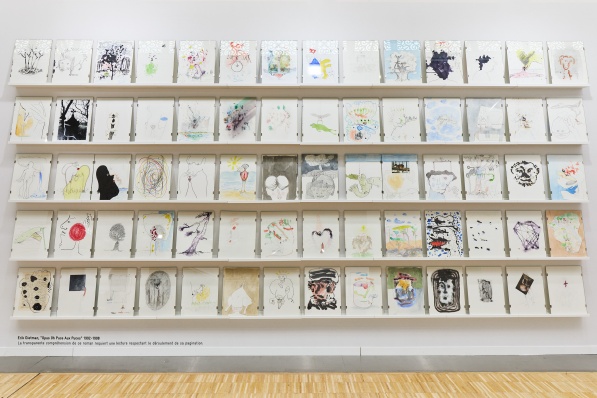Erik Dietman
Je n'ai pas vraiment de langue ni de style, tout ce que je fais sort de mon moi à moi, mois après moisfrom November 26 to January 14 - 2023
printDownload the press release

This year 2022 marks the 20th anniversary of Erik Dietman's death. We are dedicating a new solo exhibition to him. We have asked Catherine Grenier for a personal text, 28 years after having curated his monographic exhibition at the Centre Pompidou.

Erik Dietman
Je n'ai pas vraiment de langue ni de style, tout ce que je fais sort de mon moi à moi, mois après mois
november 26th 2022 - january 14th 2023
This year 2022 marks the 20th anniversary of Erik Dietman's death. We are dedicating a new solo exhibition to him. We have asked Catherine Grenier for a personal text, 28 years after having curated his monographic exhibition at the Centre Pompidou.
Les cocus du vieil art moderne/The cuckolds of antiquated modern art
Erik Dietman's personality is fascinating for its paradoxical originality: this way of being both a fierce anti-traditionalist and someone who appreciates the mastery of drawing as fundamental, or someone who evolved within intellectual circles and debates all while managing offbeat humor and self-mockery. Dietman was one of the few artists of his generation who dared to admit that he respected Salvador DalÃ's art. This is not surprising if one considers the boldness and the taste for provocation that his own works show, especially in the resounding relationship they have with the history of the avant-gardes. "Dali is a great writer, he proclaimed: reread Les cocus du vieil art moderne/The cuckolds of antiquated modern art .." A well chosen title made to please him; indeed, he whose successive periods can be read as a commentary on modern art expressed in the style of Jérôme Bosch... Never ceasing to blur the lines and combine a very solid, scholarly background with a carnivalesque spirit, he declared to those who wanted to listen: "The bad paintings are the ones that are good".
A personality all his own, what we call "unclassifiable", Dietman never renounced the radical nature characteristic of the avant-gardes. But he allowed himself the biggest imagination and total freedom, in his judgments as in his work. "In DalÃ's good paintings, there are twenty five different images", he cheered. He too cultivated this abundance of mutable images, was not bothered by the ambiguity of loose forms and was fond of culinary analogies... Present in sculpture, his interest for double images and multiple allusions was expressed most notably in his drawings. Opus, Oh puce, aux Puces is a remarkable collection of 70 double-sided drawings that come one after another like a long sentence with multiple twists. An inexhaustible poem in the form of an illustrated diary, which captures those little moments when the creative spirit comes alive, fades away, bounces back, gets lost, finds its way again... He creates a series of notations in his image: inventive, burlesque, funny, sometimes on the edge, fragile, grating, then smiling and tender.
Dietman was an unabashed portly giant, a volcano that, under pressure from his emotions and anxieties, could erupt from one moment to the next, but also someone with a sharp and demanding intelligence. All of this infuses his entire body of work. "I like to pay tribute to attitudes", explained the artist to justify his demand for coherence, and even symbiosis between the personality of the artist and his work. This is how he was able to be friends with creators with aesthetics as different as those of Roman Opalka and Roland Topor, and admire at the same time Rabelais, Joyce, Duchamp, Picabia and DalÃ. Dietman even saved "the senile DalÃ" from hell by saying with insolence: "Becoming mad really is the great masterpiece, I canât wait for this moment!" The artist passed away before reaching that moment, but he had already conceived his great masterpiece, modeled for us from the raw material of his life, his experiences and his imagination.
Catherine Grenier